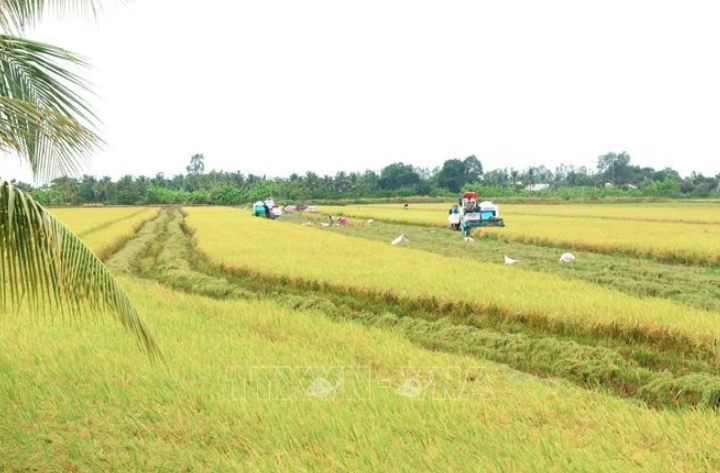Quality varieties spur Vietnamese rice industry's growth: experts
The success of the rice sector is the fruit of a concerted effort spanning research, production and trade, with high-quality seeds delivered to farmers' hands, former Minister of Agriculture and Rural Development Cao Duc Phat has assessed.
Phat, who is Chairman of the Board of Directors of the International Rice Research Institute (IRRI), said the market now needs resilient, low-emission, and quality rice varieties that adapt to climate change, adding that related research should help farmers achieve higher selling prices.
For example, regarding the nutritional content of rice, the IRRI is currently researching varieties with low glycemic index suitable for individuals with or at risk of diabetes. Currently, the price of diabetes-friendly rice stands at US$1,800 per tonne, significantly higher than the export price of normal rice, which ranges between US$500 and US$600 per tonne. Additionally, the IRRI is also studying to develop varieties with higher protein content, drought and salt tolerance, flood resilience, and other exploitable traits.
Director of the Vietnam Academy of Agricultural Sciences Professor Dr. Nguyen Hong Son, meanwhile, attributed the country’s remarkable development in the rice industry to three major achievements. These include the diversification in plant genetic research disciplines, a research workforce that matches regional standards, and the robust growth of the domestic seed industry.
Son suggested businesses commission research from institutes because each firm has different foundations in terms of rice varieties, working capabilities, and investment goals. Investing in research from the outset allows new products to best meet business objectives.
However, public-private partnerships (PPP) between the sides face challenges due to Government Decree No. 70/2018/ND-CP on planning the management and use of state property formed through implementing scientific and technological tasks using state funds. As per the document, companies do not have ownership rights over rice varieties even if they contribute to the research process.
According to Tran Kim Lien, Chairwoman of the Board of Directors of the Vietnam Seed Group (Vinaseed), the regulation against transferring exclusive varieties makes it difficult to advance public-private partnerships. Delays in the adoption of a new variety and difficult resources mobilisation occur when all businesses involved await transfer approval after the recognition of the variety.
Lien proposed the Ministry of Agriculture and Rural Development (MARD) promptly issue a list for transferring variety rights to businesses. Simultaneously, transparent technology transfer should take into account business participation based on conditions and needs. The ministry also needs to provide early guidelines on public-private partnerships to mobilise social resources for rice breeding research.
Acknowledging the challenges, Nguyen Thi Thanh Thuy, Director of the MARD’s Department of Science, Technology, and Environment, noted that the decree poses significant obstacles to research institutes in their variety transfers to businesses. However, the intellectual property law has eased such bottlenecks by granting variety ownership upon registration.
Deputy Minister of Agriculture and Rural Development Phung Duc Tien affirmed that the ministry now places top priorities on high-quality seed production, major export products, and the formation of varieties with high yield, quality, disease resistance, and climate adaptability.
In the first half of 2024, Vietnam exported 4.7 million tonnes of rice for nearly US$3 billion, up 10.4% and 32% year-on-year, respectively.
According to statistics from the General Department of Vietnam Customs, the average export price of the product went up by more than 18% over the same period last year.



